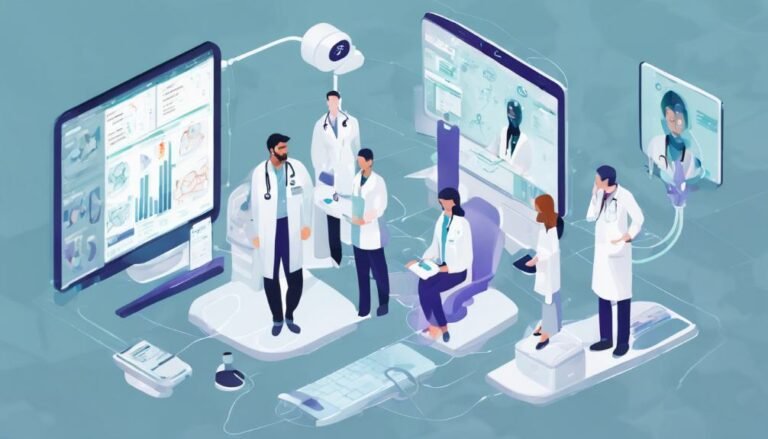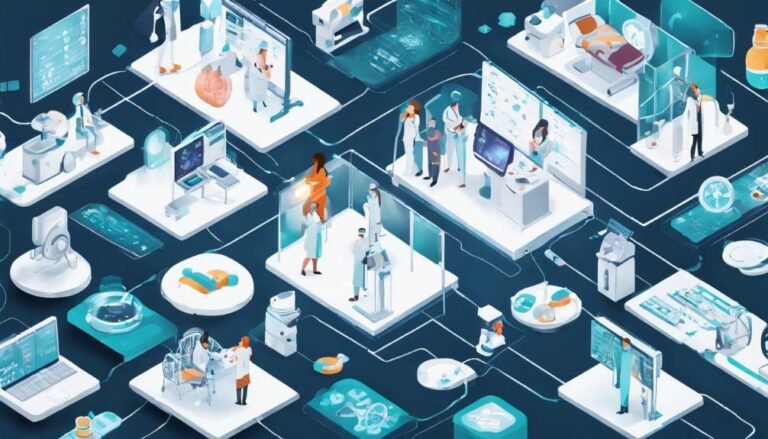AI in Healthcare Innovation
You might be skeptical about the role of artificial intelligence in healthcare, questioning its reliability and impact on patient care. However, AI has undeniably transformed the medical landscape, offering innovative solutions that are reshaping how healthcare is delivered. With advancements ranging from personalized treatment plans to predictive analytics, AI is not just a futuristic concept but a present-day reality. The potential benefits are vast, and the implications far-reaching. Let's explore how AI is revolutionizing healthcare practices and paving the way for a more efficient and effective patient-centered approach.
Key Takeaways
- AI enhances diagnostic accuracy and efficiency in healthcare.
- AI analyzes medical images with precision for better diagnosis.
- AI assists radiologists in detecting subtle abnormalities.
- AI optimizes treatment planning for improved patient care.
- AI drives innovation in drug discovery and development.
AI Applications in Medical Imaging
AI revolutionizes medical imaging by enhancing diagnostic accuracy and efficiency through advanced algorithms and machine learning techniques. When it comes to image interpretation, AI plays an essential role in providing more accurate and timely diagnoses. By analyzing medical images with precision and consistency, AI helps radiologists detect subtle abnormalities that might be missed by the human eye, ultimately improving diagnostic accuracy.
Moreover, AI contributes immensely to treatment planning by assisting healthcare providers in developing personalized treatment strategies based on the insights derived from medical imaging. Through the automation of certain tasks and the streamlining of workflows, AI optimizes the overall efficiency of the treatment planning process.
This optimization not only saves time but also ensures that patients receive timely and appropriate interventions.
Predictive Analytics in Patient Care
Utilizing predictive analytics in patient care enables healthcare professionals to anticipate potential health outcomes and tailor interventions proactively based on data-driven insights.
By analyzing vast amounts of patient data, predictive analytics can assist in risk assessment by identifying individuals who may be at higher risk for certain conditions or complications. This early identification allows healthcare providers to intervene preemptively, potentially preventing adverse events or managing conditions more effectively.
Furthermore, predictive analytics plays an essential role in treatment optimization. By analyzing a patient's historical data, current health status, and other relevant factors, healthcare professionals can personalize treatment plans to suit individual needs. This tailored approach not only enhances patient outcomes but also improves resource allocation within healthcare systems by ensuring that interventions are targeted and efficient.
Drug Discovery and Development
Enhancing drug discovery and development processes involves leveraging advanced technologies and data analytics to streamline the identification and optimization of potential compounds for pharmaceutical use. By integrating data analysis and AI algorithms, the field of precision medicine has seen significant advancements in creating personalized treatments tailored to individual patients.
AI algorithms play a vital role in drug discovery by analyzing vast amounts of data to identify potential drug candidates more efficiently. These algorithms can predict the efficacy and safety of new compounds, accelerating the development process and reducing costs.
Precision medicine, enabled by AI, focuses on understanding the genetic, environmental, and lifestyle factors that influence a patient's response to treatment. By utilizing AI-driven technologies, researchers can develop targeted therapies that are more effective and have fewer side effects for specific patient populations.
In essence, the combination of data analysis and AI algorithms in drug discovery and development is revolutionizing the healthcare industry, leading to the creation of innovative therapies that offer personalized treatments and improved patient outcomes.
Virtual Health Assistants
Virtual health assistants are becoming increasingly prevalent in healthcare settings, providing patients with personalized support and guidance in managing their health and wellness. These assistants play an essential role in enhancing patient engagement through virtual consultations, enabling individuals to access healthcare services conveniently and efficiently from the comfort of their homes.
By offering remote monitoring capabilities, virtual health assistants allow healthcare providers to track patients' vital signs, symptoms, and adherence to treatment plans in real-time, thereby improving health outcomes and reducing the need for frequent in-person visits.
Moreover, virtual health assistants serve as valuable resources for health education, delivering relevant information about medical conditions, medications, and lifestyle modifications to empower patients in making informed decisions regarding their health. Through interactive platforms, these assistants can provide tailored recommendations and reminders, promoting medication adherence and healthy behaviors.
Ethical Considerations in AI Implementation
When implementing AI in healthcare, it's important to address ethical considerations such as privacy and consent.
Detecting and mitigating biases in AI algorithms is necessary to guarantee fair and accurate healthcare outcomes.
Transparency in the decision-making process of AI systems is essential for building trust with patients and healthcare providers.
Privacy and Consent
Privacy and consent are paramount ethical considerations that must be carefully addressed in the implementation of AI in healthcare innovation. Data security plays a significant role in ensuring patient information remains confidential and protected from unauthorized access. Implementing robust encryption protocols and access controls is essential to safeguard sensitive data from breaches.
Patient autonomy must also be respected when utilizing AI technologies in healthcare. Transparency regarding how patient data is collected, stored, and used is essential to uphold patient trust and autonomy. Obtaining informed consent from patients before using their data for AI-driven healthcare solutions is imperative. This involves clearly explaining the purpose of data usage, potential risks, and allowing patients to make an informed decision about participating in AI-based treatments or interventions.
Prioritizing data security and patient autonomy not only upholds ethical standards but also fosters a culture of trust between healthcare providers, AI developers, and patients.
Bias Detection Strategies
Implementing robust bias detection strategies is essential in ensuring the ethical implementation of AI in healthcare innovation. When it comes to algorithm fairness in machine learning models used in healthcare, detecting biases is critical to prevent discrimination and guarantee equitable outcomes for all patients.
Bias detection strategies involve thorough analysis of the data inputs, model outputs, and decision-making processes to identify any disparities that may exist.
To achieve algorithm fairness, it's essential to implement techniques such as regular bias audits, diversity in dataset curation, and interpretability of model predictions. By continuously monitoring and evaluating the performance of AI systems, healthcare providers can address any biases that may arise and make necessary adjustments to improve the overall fairness of the algorithms.
Furthermore, incorporating transparency in the bias detection process allows for greater accountability and trust in the AI systems utilized in healthcare settings. Through proactive measures and a commitment to algorithm fairness, the healthcare industry can harness the power of AI to enhance patient care while upholding ethical standards.
Transparency in Decision-Making
Ensuring transparency in decision-making processes is a fundamental ethical consideration in the implementation of AI technology in healthcare innovation.
Algorithm transparency and accountability are vital aspects that need to be addressed to build trust in AI systems. Transparency in algorithms involves making the decision-making process clear and understandable to stakeholders, including patients, healthcare providers, and regulatory bodies.
By emphasizing decision-making clarity, AI systems can be held accountable for their actions, fostering a sense of fairness in healthcare practices. Transparent AI systems allow for the identification and mitigation of biases that may influence decision outcomes, promoting equity and inclusivity in patient care.
Furthermore, transparent decision-making processes enable healthcare professionals to better understand how AI arrives at specific recommendations or predictions. This understanding can lead to improved collaboration between AI systems and human experts, enhancing overall healthcare outcomes and patient satisfaction.
To summarize, prioritizing transparency in decision-making is essential for the responsible and ethical integration of AI in healthcare innovation.
Improving Healthcare Access With AI
AI plays a vital role in improving healthcare access by enabling telemedicine services, ensuring patients can receive medical advice remotely.
In rural areas, AI can bridge the gap in healthcare access by providing diagnostic support and treatment recommendations where healthcare resources are limited.
AI for Telemedicine Access
Utilizing artificial intelligence technology in telemedicine services can greatly enhance healthcare accessibility by bridging gaps in geographical barriers and expanding reach to underserved populations. AI algorithms integrated into telehealth platforms enable efficient remote consultations, allowing individuals in remote or underserved areas to access healthcare services without the need for in-person visits.
These platforms use AI to facilitate triage, provide personalized care recommendations, and even assist in remote monitoring of patients with chronic conditions. By leveraging AI for telemedicine access, healthcare providers can offer timely interventions, reduce unnecessary emergency room visits, and improve overall patient outcomes.
AI-powered telemedicine also enhances the efficiency of healthcare delivery by optimizing resource allocation and streamlining appointment scheduling. Patients benefit from reduced wait times, increased convenience, and improved access to specialists regardless of their location.
Moreover, AI-driven telemedicine solutions contribute to cost savings for both patients and healthcare systems, making quality healthcare more financially accessible to a broader population.
AI in Rural Healthcare
In rural healthcare settings, the integration of artificial intelligence presents significant opportunities to improve healthcare access through innovative technological solutions. AI-powered telehealth solutions play an essential role in overcoming the barriers of distance and limited healthcare facilities in remote areas. By utilizing telehealth platforms driven by AI algorithms, individuals in rural communities can connect with healthcare providers virtually, receive medical consultations, and access specialist care without the need to travel long distances.
Moreover, AI enables remote diagnostics in rural healthcare settings by analyzing medical data, images, and symptoms to assist healthcare professionals in making accurate and timely diagnoses. Through machine learning algorithms, AI can identify patterns in patient data, aiding in the early detection of diseases and improving treatment outcomes for individuals in underserved rural areas. This capability not only enhances healthcare access but also reduces the burden on rural healthcare facilities, ensuring that patients receive quality care regardless of their location.
Future Trends in AI Healthcare Integration
To stay ahead in the rapidly evolving landscape of healthcare, understanding the emerging trends in AI integration is essential for organizations looking to optimize patient care and operational efficiency.
One future trend in AI healthcare integration is the advancement of remote monitoring capabilities. AI technology enables real-time tracking of patient data, allowing healthcare providers to remotely monitor essential signs, medication adherence, and disease progression. This trend enhances patient care by providing timely interventions and reducing the need for frequent in-person visits.
Another key trend is the development of personalized treatments through AI. By analyzing vast amounts of patient data, AI algorithms can identify individualized treatment plans based on genetic predispositions, lifestyle factors, and past medical history. Personalized treatments not only improve patient outcomes but also minimize trial and error in healthcare delivery, leading to more effective and efficient care.
Incorporating these future trends in AI healthcare integration can revolutionize the way healthcare is delivered, offering tailored solutions that enhance patient outcomes and streamline operational processes. Organizations that embrace these advancements are poised to lead the way in providing high-quality, patient-centered care.
Conclusion
To sum up, AI in healthcare innovation offers immense potential for improving patient outcomes and streamlining processes. Despite concerns over privacy and data security, the benefits of AI in healthcare far outweigh the risks.
By leveraging advanced technology and data-driven insights, medical professionals can provide more accurate diagnoses, personalized treatment plans, and enhanced patient care. Embrace the power of AI to revolutionize the healthcare landscape and ultimately save lives.







